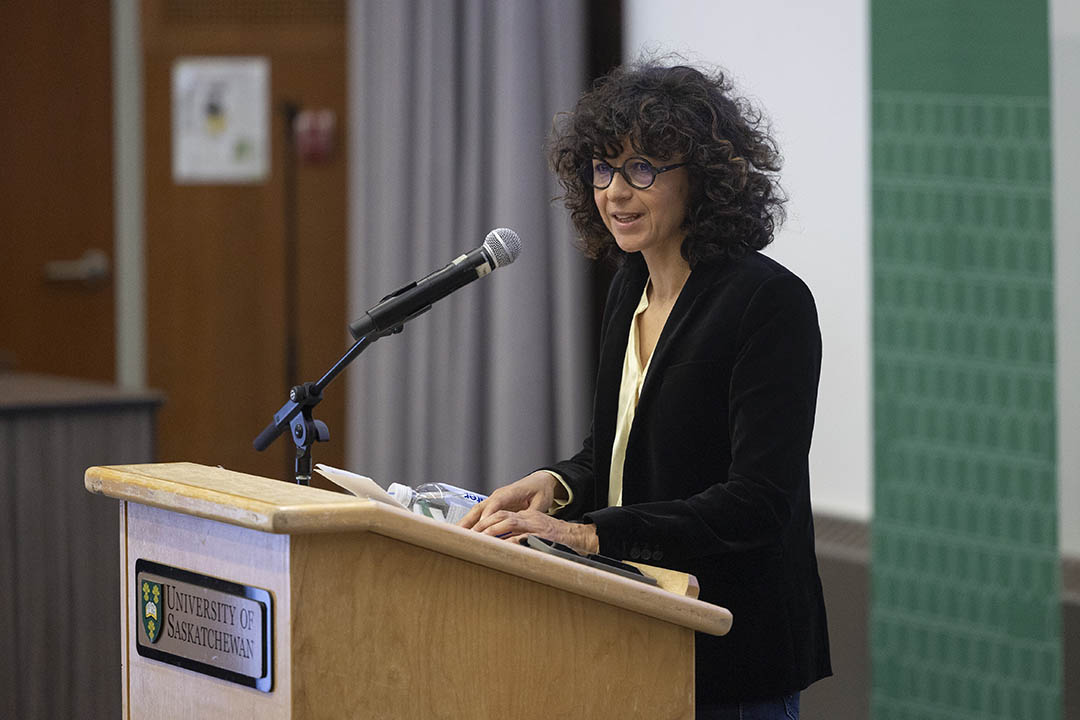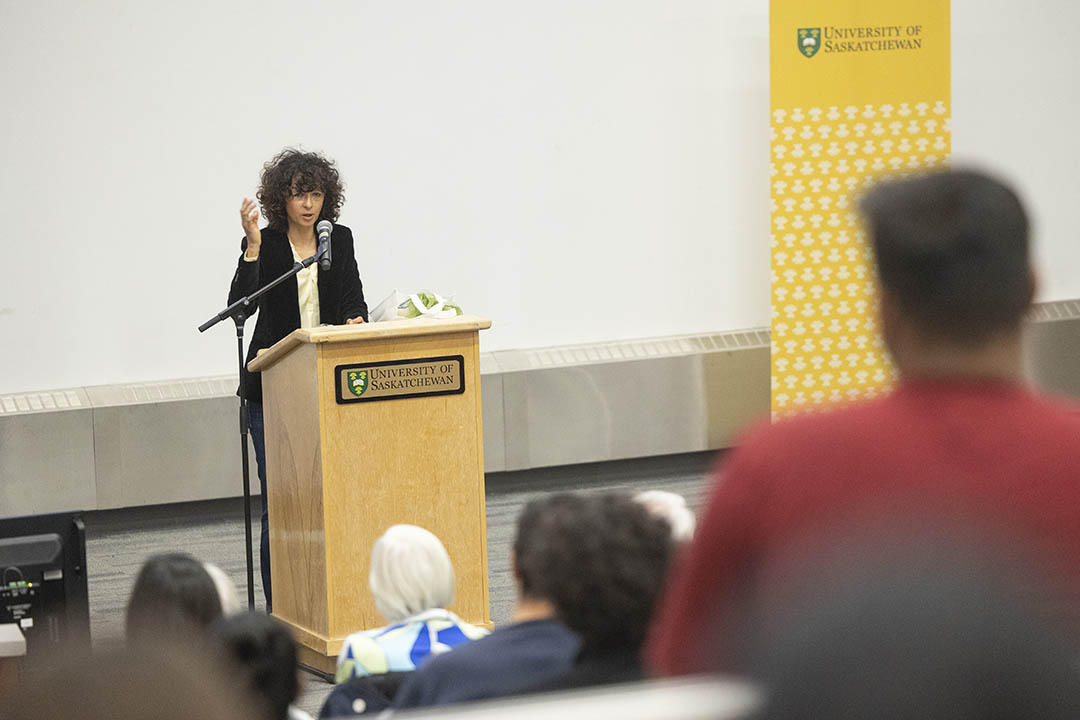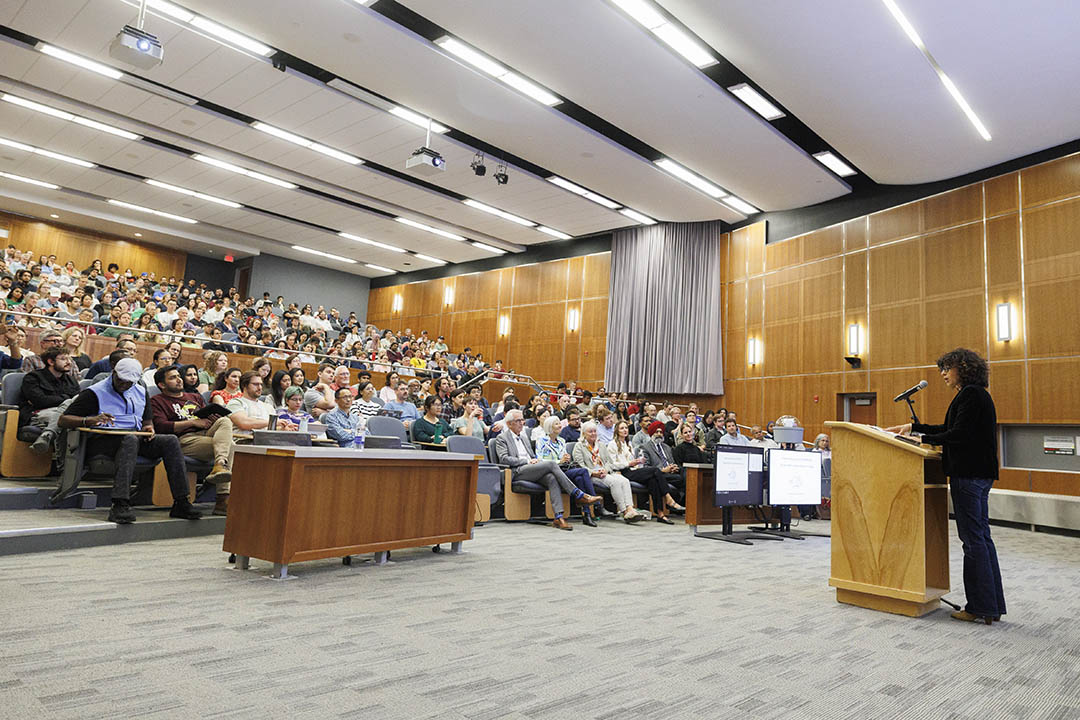
USask hosts Nobel Prize winner and honorary degree recipient
“How does it feel knowing your work benefits everyone on Earth?”
By Matt Olson, Research Profile and ImpactIt’s the first question that was asked of Nobel Prize-winning scientist Dr. Emmanuelle Charpentier (PhD) on her visit to the University of Saskatchewan (USask), from one of the nearly 200 high school students attending her first lecture of the week.
Charpentier’s thoughtful answer gave every future scientist in the room something to think about.
“It’s very rewarding. Experiments do not always work. Even simple experiments do not always work,” she said. “You always ask yourself ‘what is the chance my research will make a difference?’ And the chances are often low. What helped me a lot in keeping my spirits high is, I understood at the end of the day that biology is a multitude of scientists who bring something positive to the puzzle. Even if you think what you do is not going to transform the world, it’s going to help in the process of the research. For the CRISPR project, I spent many hours developing hypotheses, plans, and experiments, and the predictions and vision regarding the applications of this technology proved to be accurate.”
Charpentier received the Nobel Prize in Chemistry alongside Dr. Jennifer Doudna (PhD) in 2020 for their development of the CRISPR-Cas9 gene editing methodology. That work, which allows scientists to precisely examine, cut and edit genes, has led to massive strides in fields like molecular genetics, genomics, agriculture, and environmental biology.

In 2024, Charpentier was given an Honorary Doctor of Science from USask, the university’s most prestigious award. Her visit to USask on May 12-13 was a tremendous boon to the university and signified USask’s position as a critical research institution and ecosystem to be what the world needs in research and innovation.
“USask is honoured and humbled to receive Dr. Charpentier at our beautiful campus,” said USask Vice-President Research Dr. Baljit Singh (PhD). “Her incredible insights are respected and renowned worldwide, and this is truly a once-in-a-lifetime opportunity for many to receive wisdom from a Nobel Prize-winning researcher.”
The trip to USask and lectures from Charpentier were made possible in collaboration with The Gairdner Foundation. The foundation’s mission is to celebrate, inform, and inspire scientific excellence around the globe. Established in 1957, The Gairdner Foundation has given 434 awards for outstanding scientific research, and more than 100 have gone on to win the Nobel Prize – including Charpentier, who won the Gairdner Award in 2016.
Charpentier serves as the director of the Max Planck Unit for the Science of Pathogens in Berlin, and USask delegations have fostered strong relationships with scientific collaborators in Germany over the years.
“We appreciate the opportunity to partner with The Gairdner Foundation to host this lecture,” USask president Peter Stoicheff said ahead of Charpentier’s lecture. “Dr. Charpentier’s revolutionary CRISPR genome engineering technology is used daily in University of Saskatchewan research labs. A Nobel Laureate and visionary entrepreneur, she is a role model for researchers around the world, and we’re proud she has an honorary degree from our university.”
Charpentier spoke to a lecture hall of high school students during her first full day in Saskatoon, fielding questions about her own work with the CRISPR-Cas9 tool as well as broader questions about her career and her advice for aspiring scientists. She also toured USask’s world-renowned Vaccine and Infectious Disease Organization (VIDO) facilities, where she met with researchers and got a close look at the international-level expertise and methodology housed in VIDO’s facilities.

The next day, she spoke to a room full of more than 400 USask faculty, students, staff, and alumni, providing a deep dive into the work that has cemented her reputation on the world stage and helped earn her a Nobel Prize.
“What helped me is I have done diverse research in my lifetime. I knew there was a need for better genetic tools, specifically for human cells,” she said during the lecture. “This technology has been adopted very quickly and on a large scale, and it is very gratifying to see how much it has been developed and applied.”
USask is a leader on the world stage in fields including immunology, agriculture, water sciences, biochemistry, and more. Researchers across the USask campus in numerous fields use Charpentier’s CRISPR gene-editing technology to make breakthroughs that contribute to helping people right here in Saskatchewan and around the globe.
Having Charpentier visit Canada and USask – a place where her innovation is being used to benefit everyone – is a magnificent experience for faculty, students, and future students at the university.
“Now we know that we can find many interesting mechanisms that can be exploited by understanding our biological world, whether it is to study the diversity of micro-organisms, of plants, or of animals on the planet,” Charpentier said. “It’s looking at the diversity that will help us find keys to help us face the challenges of the future.”
Together, we will undertake the research the world needs. We invite you to join by supporting critical research at USask.

